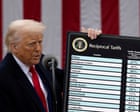
In a week characterized by significant developments across trade, politics, and finance, global stakeholders are noticing shifts that may reshape certain landscapes. From potential tariffs affecting European food exports to new political ventures in the United States, each event highlights changing dynamics in different sectors.
A noticeable development occurred when former U.S. President Donald Trump threatened to impose 17% tariffs on food and farm produce coming from Europe, an action that has created ripples across the economic and political arenas. The proposed tariffs could impact a variety of popular products like Belgian chocolates, Irish Kerrygold butter, and olive oils from Italy, Spain, and France. Responding to this, the European Union has expressed a preference for negotiation yet indicated readiness for a potential trade war should retaliatory tariffs become necessary. Such measures underscore the delicate balance required in maintaining international trade relationships amid shifting policies.
Meanwhile, in the realm of politics, billionaire entrepreneur Elon Musk has indicated a move towards establishing a new political outfit referred to as the ‘America party.’ In discussions on social media, Musk suggested this party might concentrate efforts on a select few congressional seats to become pivotal in deciding legislation within the U.S. Congress. This initiative surfaces against the backdrop of Musk’s ongoing disputes with Donald Trump, particularly over significant legislative bills signed into law. As political balance and power dynamics evolve, Musk’s potential party could bring new perspectives and challenges to the traditional political system.
On the financial front, consumer behavior and financial outlooks are poised for adjustment as buy now, pay later (BNPL) loans will soon influence U.S. credit scores. While some users express concerns over decreased spending capabilities and potentially higher interest rates, financial experts suggest that this change could ultimately benefit borrowers by promoting greater financial responsibility and improving credit histories. Despite initial apprehensions, this shift in financial policy represents an opportunity for enhanced personal financial management and growth.
As each of these stories unfolds, they reflect broader themes of adaptation and innovation. International trade must tread carefully amid potential tariffs, ensuring the smooth flow of beloved products while preserving economic stability. In politics, new parties and ideas challenge established systems, inviting conversations about future governance models. Financially, changes in credit reporting highlight the ever-evolving landscape of consumer finance, prompting users to stay informed and proactive in their personal monetary management.
Collectively, these developments remind us of the interconnected nature of global systems and the thoughtful consideration necessary to navigate changes harmoniously. As stakeholders in these various realms collaborate to find common ground, there is optimism that wise decisions will pave the way for progress and stability.
Source: {link}
